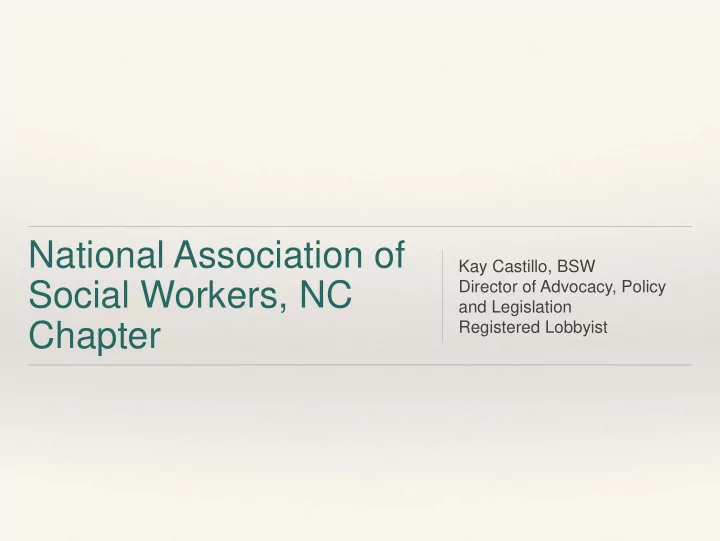

National Association of Kay Castillo, BSW Director of Advocacy, Policy Social Workers, NC and Legislation Chapter Registered Lobbyist
National ❖ Membership Organization ❖ 501(c)(6) ❖ Board of Director Oversight ❖ Committees ❖ National Job Bank ❖ Legal Consultation ❖ Practice perspectives, Legal Issue of the Month ❖ Continuing Education
Director of Advocacy, Policy and Legislation ❖ Coalitions ❖ Advocacy Committees ❖ Legislative Sessions ❖ Work with State Departments, Governor’s Staff, Administrative Liaisons
Legislative Agenda Developed by our Legislative Committee for two years at a time: - Focus on professional social work, children, health care, aging and disabled adults - Coming Soon! - Anticipated Priorities include: hiring degreed social workers in state social work positions, raising the age for youth prosecuted as adults, access to affordable behavioral health care and health insurance, repeal House Bill 2, etc.
State Issues- Legislative ❖ Medicaid Reform/Medicaid Expansion ❖ Integrated Care ❖ Balanced Budget: looking at micro details ❖ Raise the Age ❖ State Social Work Series A lot will depend on what happens Nationally
Why Advocate? • You are the expert of YOUR field • Senators and Representatives are PART time • We work in the community and can relay messages of the problems we see • We can help influence permanent solutions • If you’re not at the table, you’re what’s for lunch
Why Social Work? • Social workers are broad based • Social workers assess people, communities, organizations • Social workers put action to issues • It’s in our Code of Ethics: Section 6.04, “Social workers should engage in social and political action…”
Messaging How are you going to sell this message to policy leaders? • Develop fact sheets • Develop a tag line: “Public Health Social Workers Save Lives” • Identify who can deliver this message
Go online- Messaging Social media is a powerful way to get your messaging out • Twitter: Tweet to legislators and members of the press and develop a hashtag for others to use (#justonelegislator) • Facebook: Create a group, share your message, get other groups to share your message • Blog: Blog about the issue and share on social media • Website: Have a place for others to search you and the issue
Community Advocacy Determine who your issue impacts and reach out to those groups- local association, Rotary, school board, etc. Get creative! Attend County Commissioner Meetings- reach out to them. Can we be on the agenda at your next meeting? Gather a Coalition or other supporters and engage powerful stakeholders in the community Example: Corporal Punishment: County by county
Engaging State Leaders Some issues are bigger than the county you live in….determine if you should go higher: • Communicate with leaders on issues in your district • Get on listservs for DHHS, DJJP, the Governor, etc • Be a resource to state leaders- reach out to them • Respond to RFPs, RFIs, Policy changes, etc.
Engaging Legislators • Contact your Representative and Senator and request a meeting • Invite them to your place of practice • Follow up regularly on issues you see or that your clients face • Help write legislation • Ask to speak at a committee meeting on your issue
Clients Advocate Social workers tell me that once they empower clients to advocate, they see a new market of change. Client builds self confidence and can speak louder on personal experience.
Advocacy Do’s 1. Do be truthful. You want to gain respect. 2. Do relate the issue back to the district- present the need. 3. Do show knowledge on both sides of the issue. 4. Do admit if you do not know the answer. Report back to them with the facts. 5. Do show interest in getting to know their staff. 6. Do follow up with a thank you call, email, or letter.
Advocacy Don’ts 1. Don’t lie. 2. Don’t be disrespectful. 3. Don’t argue 4. Don’t overload with too much information. One visit, one subject. 5. Don’t let the conversation get sidetracked. 6. Don’t assume they know what you are talking about.
When discussing an issue Answer: Why are you here? What is your message? Find out their position on the issue. Do they support it? Leave information behind that they can reference or share with others. Don’t be nervous!
Responses • Supportive : offer to present at a meeting or provide them with more information. Ask: What can I do to help you on this issue? • Opposed : listen to their position, offer your position, find common ground. They may consider your position and lessen their opposition or work with you on a compromise. • On the fence : what you say may influence their decision. Ask how you can help formulate their opinion- give them information, speak to others, etc.
Keep at it! Some advocacy messages take YEARS to get through. Some times your message will change based on who is in charge: Expand Obamacare! Expand Medicaid! Everyone should have access to affordable insurance!
DISCUSSION QUESTIONS 1. In what ways do you feel the Social Work Section of NCPHA can provide support to you in your role as a public health social worker? 2. What is the most important issue that you feel needs to be addressed by NCPHA that will help PHSW clients and/or advance the profession of PHSW? 3. What topics would you like to see addressed in future public health social work trainings, webinars and conferences?
EVALUATION AND CERTIFICATE IN A FEW DAYS YOU WILL RECEIVE AN E-MAIL THAT WILL DIRECT YOU TO A LINK THAT YOU WILL USE TO COMPLETE THE EVALUATION FOR TODAY’S PUBLIC HEALTH SOCIAL WORK TOWN CALL/WEBINAR AND TO RECEIVE YOUR EDUCATIONAL CONTACT HOUR CERTIFICATE. THANK YOU FOR YOUR PARTICIPATION TODAY!
Recommend
More recommend